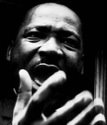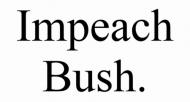King Touched Lives with 1959 Visit to Earlham
By Don Fasnacht
 Martin Luther King Jr. was first and foremost an orator, a preacher, a man of words.
Martin Luther King Jr. was first and foremost an orator, a preacher, a man of words.
He established his leadership and expressed the courage of his convictions with the strength of his language.
He spoke some of those words in Richmond on April 23, 1959, when he addressed a convocation at Earlham College. He said then, "Time is running out for us, and the cancer of segregation in the body politic must be removed before the health of our American democracy can be established."
Four years later, he became the icon of the civil rights movement with the rhythmic rhetoric of his "I have a dream" speech during the March on Washington.
His work will be remembered nationwide and locally this weekend. A national holiday in his honor is Monday.
For 1959 Earlham graduate Roger Cornett, King's presentation instilled a powerful, lasting image.
"I still have a mental image of being there," Cornett said.
"When I went in, I thought it was just another convocation," Cornett said. "It was a total surprise. It was electric."
Earlham students of that era were required to attend two convocations a week.
There was a murmur through the audience of "who is this guy," Cornett said. He wasn't known here then. King was identified in the Palladium-Item story as "a well-known Southern religious leader." The civil rights movement was "not a big issue here yet," Cornett said.
Then King began to speak. His unamplified voice was soft, and Cornett, sitting in the balcony, had to lean forward to hear.
"But within a minute, you could have heard a pin drop," Cornett said. "He captivated the whole bunch of us," Cornett said.
Cornett went on after graduation to head Belden and was elected mayor of Richmond, but that moment stands out.
"After what was to come in the next few years, it was amazing to remember being there and hearing him," Cornett said.
Landrum Bolling remembered King, too. And King remembered him.
"The last time I saw King was in an airport in Greensboro, N.C.," Bolling said. "I heard someone shouting my name. I turned around, and it was King.
"He wanted to talk about his visit to Earlham," which had been several years before, Bolling said. "He remembered it clearly."
Bolling said King had been invited to Earlham by Elton Trueblood, longtime Earlham faculty member and Quaker theologian. King's insistence on non-violence dovetailed with the Quaker heritage of the local college. Bolling was inaugurated as president of Earlham that year.
Bolling's daughter went on to work for King's movement during the 1963 March on Washington.
Both Bolling and Cornett remember King as small in stature, "a short fellow," Bolling said. But Cornett used the word "charisma" and Bolling said "exciting" in speaking of King.
Richmond pastor and Richmond human rights director Ron Chappell never heard King speak in person and never met him in an airport.
But King affected his life.
"I remember as a young soldier how much he impressed me," Chappell said.
"I'd come back from Vietnam (in the '60s). I was happy someone was standing up," Chappell said.
Nine years after he was at Earlham, King was in Memphis, Tenn., supporting striking sanitary workers in what he saw as a fight for economic justice.
On April 3, 1968, King's language rang out again.
"I just want to do God's will. And he's allowed me to go to the mountain. And I've looked over, and I've seen the Promised Land! I may not get there with you, but I want you to know tonight that we as a people will get to the Promised Land."
The next day a rifle bullet killed King as he stood on a motel balcony. His voice was stilled, but his words live on.
 Martin Luther King Jr. was first and foremost an orator, a preacher, a man of words.
Martin Luther King Jr. was first and foremost an orator, a preacher, a man of words.He established his leadership and expressed the courage of his convictions with the strength of his language.
He spoke some of those words in Richmond on April 23, 1959, when he addressed a convocation at Earlham College. He said then, "Time is running out for us, and the cancer of segregation in the body politic must be removed before the health of our American democracy can be established."
Four years later, he became the icon of the civil rights movement with the rhythmic rhetoric of his "I have a dream" speech during the March on Washington.
His work will be remembered nationwide and locally this weekend. A national holiday in his honor is Monday.
For 1959 Earlham graduate Roger Cornett, King's presentation instilled a powerful, lasting image.
"I still have a mental image of being there," Cornett said.
"When I went in, I thought it was just another convocation," Cornett said. "It was a total surprise. It was electric."
Earlham students of that era were required to attend two convocations a week.
There was a murmur through the audience of "who is this guy," Cornett said. He wasn't known here then. King was identified in the Palladium-Item story as "a well-known Southern religious leader." The civil rights movement was "not a big issue here yet," Cornett said.
Then King began to speak. His unamplified voice was soft, and Cornett, sitting in the balcony, had to lean forward to hear.
"But within a minute, you could have heard a pin drop," Cornett said. "He captivated the whole bunch of us," Cornett said.
Cornett went on after graduation to head Belden and was elected mayor of Richmond, but that moment stands out.
"After what was to come in the next few years, it was amazing to remember being there and hearing him," Cornett said.
Landrum Bolling remembered King, too. And King remembered him.
"The last time I saw King was in an airport in Greensboro, N.C.," Bolling said. "I heard someone shouting my name. I turned around, and it was King.
"He wanted to talk about his visit to Earlham," which had been several years before, Bolling said. "He remembered it clearly."
Bolling said King had been invited to Earlham by Elton Trueblood, longtime Earlham faculty member and Quaker theologian. King's insistence on non-violence dovetailed with the Quaker heritage of the local college. Bolling was inaugurated as president of Earlham that year.
Bolling's daughter went on to work for King's movement during the 1963 March on Washington.
Both Bolling and Cornett remember King as small in stature, "a short fellow," Bolling said. But Cornett used the word "charisma" and Bolling said "exciting" in speaking of King.
Richmond pastor and Richmond human rights director Ron Chappell never heard King speak in person and never met him in an airport.
But King affected his life.
"I remember as a young soldier how much he impressed me," Chappell said.
"I'd come back from Vietnam (in the '60s). I was happy someone was standing up," Chappell said.
Nine years after he was at Earlham, King was in Memphis, Tenn., supporting striking sanitary workers in what he saw as a fight for economic justice.
On April 3, 1968, King's language rang out again.
"I just want to do God's will. And he's allowed me to go to the mountain. And I've looked over, and I've seen the Promised Land! I may not get there with you, but I want you to know tonight that we as a people will get to the Promised Land."
The next day a rifle bullet killed King as he stood on a motel balcony. His voice was stilled, but his words live on.





0 Comments:
Post a Comment
<< Home